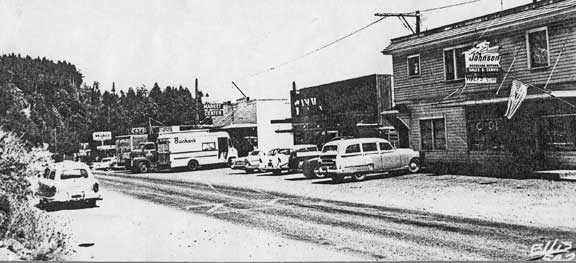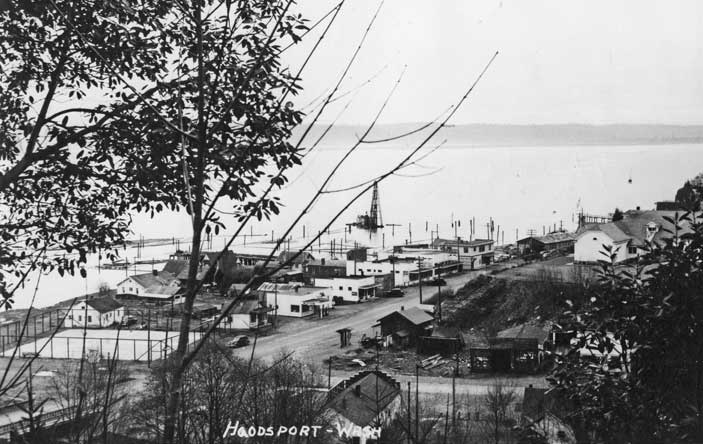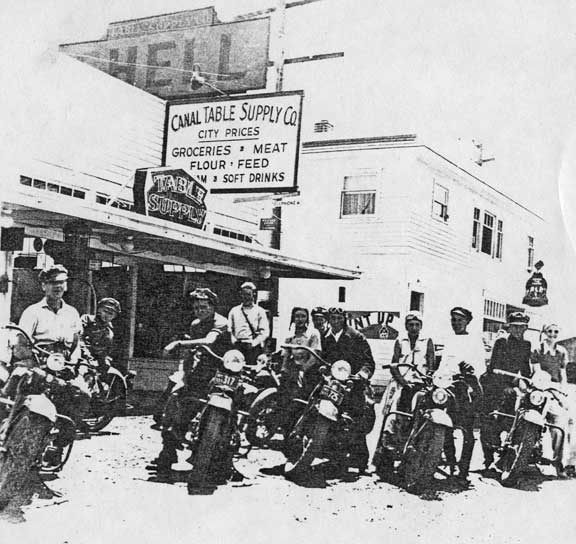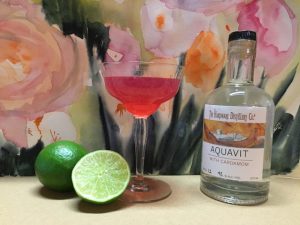THE HISTORY OF HOODSPORT is steeped in distilling
Much of this history of Hoodsport is taken from the book, History of Hoodsport, Gateway to the Olympics–Ida’s Story by Jean L. Bearden, 1987, Fourth revised edition 1994.
Photos are from the Mason County Historical Society.
BOOTLEGGING
Hoodsport seems very tame today compared to the history in Jean L. Bearden’s book.
Ms. Bearden has a little information about the hardware building itself, but it’s the great adventures from the days of bootlegging that are fascinating. If history repeats itself, we will have a grand adventure with our distillery, but without the shoot-outs, car chases, and boating adventures.
Washington State preceded the Federal Government at both ends of prohibition.
Prohibition began in Washington on November 3, 1914, when voters approved Initiative 3, which prohibited the manufacture and sale of liquor. In November 1918, Washington became bone dry.
On the Federal level, the 18th Amendment was ratified in 1919, and went into effect in January, 1920.
By 1924, Prohibition had become big business on the Hood Canal. It was at this time that Clarence Shively, also known as Dick Shively, a former policeman, was arrested for participating in a bank robbery. He escaped, was caught, posted bond, and returned to the Canal.
In 1926 Shively’s ranch at Shelton was invaded by Federal men and the local sheriff, who found the largest cache of moonshine they had ever seen. Shively escaped under gun-fire and hid out for a time. Shortly afterward, his wife Edna was arrested. Dick’s freedom was short-lived when he was arrested after a wild car chase. He posted bail, forfeited and started his next whiskey still. He was arrested again in 1927, with the same result.
In 1928 the government was more determined. This is Ms. Bearden’s account from testimony at the trial of Dick Shively:
- These officers went to Shively’s ranch at Hammersly Inlet at night, lying in wait from 11:00 p.m. to 4:00 a.m., when they saw a car coming from the Shively place at high speed. They tried to flag the car down, and when it didn’t stop, they opened fire at the car and gave chase. They finally located the car on the upper part of the ranch, abandoned, with a bullet hole in the gas tank. Seventy-five gallons of moonshine were found in the car, and a number of kegs had been thrown out of the car along the way. They spotted a man running toward the waterfront and grabbed him just as he was taking off in a boat with one hundred gallons of whiskey.
The jury failed to reach a verdict after 23 hours of deliberation. A mistrial was declared, and Shively was free.
- In 1928 bootlegging was a hobby on the canal with stills at several homes. By 1929, bootlegging had become a major business in Hoodsport.
Others joined Shively in the manufacture and distribution of spirits, and they often used the Hood Canal to transport their products across the water at night. They opened dance halls and taverns, were often arrested, and considered the forfeiture of bail as part of the cost of business.
Washington acted more quickly than the federal government in abolishing prohibition, doing so three months before the 21st Amendment repealed prohibition in February, 1933. The first legal alcohol in Hoodsport was served by Rose Millo. She served beer in her soda fountain, which was next door to the Hardware Distillery building.
THE HARDWARE DISTILLERY BUILDING
In 1930 E. H. Harris built a new structure that was divided to provide two business spaces. One half was rented to Mr. and Mrs. Guhr, who started a grocery business named the Canal Table Supply. The other half was an electric shop run by George ‘Scotty’ Lavender and his wife, Harriet.
 In 1935 the Canal Table Supply store was sold to the Johnsons. The Johnsons sold it to Blanche and Archie Callahan, who shortened the name to Canal Supply. The Canal Supply sold clothing, fishing tackle, and notions, and a Washington State Liquor Store was included.
In 1935 the Canal Table Supply store was sold to the Johnsons. The Johnsons sold it to Blanche and Archie Callahan, who shortened the name to Canal Supply. The Canal Supply sold clothing, fishing tackle, and notions, and a Washington State Liquor Store was included.
The property was sold in 1957, and remodeled to become Nickels’ Mercantile and V&S Variety.
Raymond and Karen Nelson purchased the property in 1990 and sold it in 1996 to Marjorie S. Davis, dba G & M True Value Hardware. In 2010, she sold to the Hoodsport Diner, LLC, and it remained dormant until purchased by us in 2012 and named The Hardware Distillery Company.
CHARACTERS OF HOODSPORT
Ms. Bearden’s book includes some items of great amusement. Here are two of the stories of the characters of Hoodsport.
The Rydeens
Oscar Rydeen, a quiet man of few words, was a Swede from the old country. According to Jean Bearden’s history, he went to Alaska in 1925, where he met his bride Pauline, who was “engaged in the oldest profession known to man, until Oscar made an honest woman of her.”
Oscar was a self-taught barber, and he and Pauline built a home combined with a barber shop and shower room, so the loggers who came from camp at the end of the week could be refreshed with a haircut and a bath. Their shop and home were always spotlessly neat and clean, and it was papered and painted so often, it would be impossible to get to the original wood. Sometimes, the showers included assistance from Pauline at no extra charge.
Before getting a haircut, customers usually called the neighbors to see whether or not Oscar was sober, a reasonable precaution as he would cut hair for just as long as he could stand up, no matter how inebriated at the time. Some unlucky customers were dismayed when they received what could mildly be described as uneven haircuts — chunks of hair missing here and there, and an occasional nick in the scalp. As Oscar was the only barber in his area, his state of sobriety was of great concern to the male population. Oscar had been known to use a straight edge razor to shave a customer while holding on the poor man’s nose to steady himself for the wielding of the razor.
The Rydeens lived in Hoodsport for more than 30 years, living a quiet life, at times, and then ogong on long drinking binges, livening up the town.
In 1926 the town especially enjoyed their mail delivery.
Ms. Bearden reports:
Hoodsport patrons began showing a little more enthusiasm for the mail deliveries, as it was being delivered by a lovely young lady who had been the last year’s “Miss Washington State.”
Miss Washington State delivered the mail all over the canal on a fourteen-foot outboard motor boat, missing only one day all year because of bad weather.




